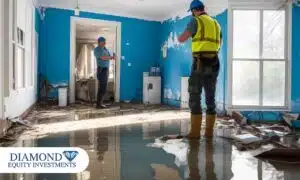
If it feels like it’s been raining more than usual this year, that’s because it has. July saw one of the costliest storms in Chicago’s history, a storm that highlighted the undeniable reality that climate change is increasing the frequency of severe weather. Expect it to happen again this year.
It’s true, you can’t control the weather, but you can be prepared. These preventative measures will protect your basement from water damage. This way, when you sell to cash home buyers in Chicago, you get more money.
Understanding Chicago’s Flood Risks
Chicago is known for having heavy rainfall, but did you know the snow melts rapidly too? Also, since the infrastructure is old, and everything is in close proximity to Lake Michigan, most of the Chicago area is at risk of flooding.
Homeowners, especially those with historic or older homes, need to understand these risks. Understanding is the first crucial step in flood prevention.
Is A Flooded Basement Dangerous?
When water fills your basement, think twice before going downstairs. Standing floodwater can be dangerous in several ways:
Risk Of Electrocution: Many electrical components are in the basement. Never enter a wet basement without turning off the power first.
Black Water Contamination: Floodwater can contain sewage, fungi, and bacteria. If it’s not removed, the basement becomes extremely dangerous
Extensive Mold Growth: Mold grows rapidly in a flooded basement. It also releases unhealthy spores into the air that can cause serious respiratory issues.
Foundation Problems: Flooding can create tiny fissures in concrete walls, and these weaken the foundation and accelerate house shifting.
Structural Issues: Floodwater can wick moisture upward, compromising the structural integrity of framing and drywall.
How Do I Protect My Chicago Basement From Flooding?
1. Clean Your Gutters
It might not seem like your gutters are connected to your basement, but they play a crucial role in directing rainwater away from your home. Clean your gutters each spring and fall to ensure they don’t overflow during a rainstorm. Full gutters can cause water to flow toward your home’s foundation and basement.
2. Check Your Foundation For Cracks
Inspect your home’s foundation inside and outside. Look for cracks or gaps. Use waterproof caulk to seal small cracks. If more extensive cracks are found, contact a professional to repair them before they allow water into your basement.
3. Check Your Home’s Grading
Grading refers to the slope of the ground around your home. If it doesn’t slope away from your house, rainwater may drain near your foundation and basement. This can cause significant damage from flooding. Re-grade your property if needed.
4. Install A Sump Pump
Since Chicago basements are particularly vulnerable to flooding, most homeowners have a sump pump, as it’s one of the best tools for preventing standing water accumulation.
Sump pumps collect water and pump it outside before it can flood your basement. Installing a sump pump can keep your basement dry, especially during a heavy rain storm.
Additional Tips To Prevent Basement Flooding
- Inspect foundation walls for cracks regularly and fill whatever you find.
- Ensure floor drains are clog-free.
- Regularly test your sump pump to ensure it works.
- Follow city recommendations when disconnecting downspouts from the sewer system.
- Install well covers over basement windows and keep window drains clear.
- Consider changing the grade around your property to prevent basement flooding.
Does Your Basement Have Major Issues?
Protecting your old Chicago home from flood damage is essential. All you have to do is take these preventative measures.
But what if your house is too old and your basement is weak? An unsound basement can lower your property’s value. In this case, consider selling your old house to cash home buyers. You can sell it as it is!
At Diamond Equity Investments, we buy houses in Chicago in any condition. Expect a fast and convenient sale when you choose us. We’ll handle all the details from start to finish, and ensuring your satisfaction will be our number-one priority.




